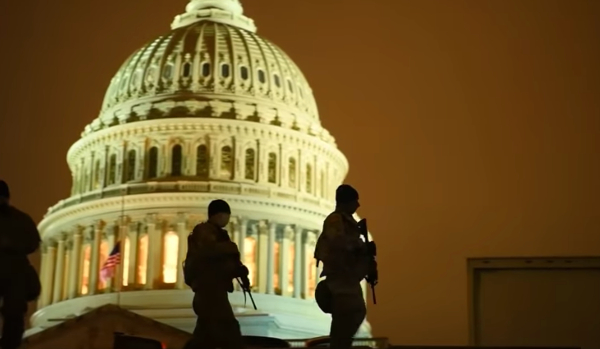
Reminiscent of what happened in the last election when turmoil arose as Black Lives Matter and Antifa staged protests, state officials took precautionary measures in advance for what they said is "ensuring public safety."
Democratic Governor Jay Inslee of Washington announced back on Nov. 1 that he had already put the state-based military force on standby for the duration of Nov. 4 to 7.
"The U.S. Department of Homeland Security has warned that threats to election infrastructure during the 2024 election cycle remain high," Inslee noted in his communication to the National Guard.
The decision was influenced by the creation of the Capitol Hill Autonomous Zone (CHAZ) in Seattle back in 2020. Moreover, according to Inslee, the recent "election-related unrest" is the reason behind the precautionary move.
On Oct. 28, devices marked "Free Gaza" were reportedly detonated inside ballot boxes in Portland, Oregon and Vancouver in Washington. Authorities in Portland suspect the events were connected.
Oregon's Democratic Governor Tina Kotek did the same as her neighbor, involving the National Guard as she claimed that any voter intimidation would be "un-American and will not be tolerated."
Flashback: This is what the Antifa CHAZ occupation and Antifa riots looked like in 2020 in Seattle. For over 3 weeks, violent Antifa members took over a large area of the city and created "border" checkpoints. Multiple people were shot and killed there. pic.twitter.com/kVj7qF3UkE
— Andy Ngo ???? (@MrAndyNgo) September 4, 2024
Meanwhile, Portland Mayor Ted Wheeler stated, "No current information suggests unrest, but there is a lot of uncertainty [and] tension in our community."
Following the same "precautionary measure," Nevada Governor Joe Lombardo, a Republican, confirmed that 60 National Guard members were “in place” to ensure a "safe and smooth Election Day."
In Washington, DC, Police Chief Pamela Smith said that they had over 3,000 officers working 12-hour shifts.
In the vicinity of the White House, businesses also participated in anticipation of potential violence. Similarly, the U.S. Secret Service (USSS) also erected eight-foot-high fences around the official residence of the POTUS as well as outgoing Vice President Kamala Harris' residence. (Related: INSANITY: New York State deploys National Guard to help ILLEGALS with PAPERWORK.)
Portland businesses are boarding up because of all the mostly peaceful, inclusive, and tolerant city folk that say MAGA is a threat to democracy.
Is it rednecks that are going to burn the city down? Or is it the white dudes for Harris crowd *aka ANTIFA & BLM* pic.twitter.com/7B7M2CJuDv
— ?Native Patriot ?? (@LaNativePatriot) November 1, 2024
110 National Guardsmen helped provide cybersecurity for their states' elections
According to reports, nearly half of the National Guard personnel who were deployed to active duty for the election assisted local officials on how to deal with cyber threats.
As per officials, a total of 15 states activated 252 National Guardsmen for the election: Alabama, Arizona, Delaware, Hawaii, Iowa, Illinois, North Carolina, New Mexico, Oregon, Pennsylvania, Tennessee, Texas, Washington and Wisconsin. Roughly 110 were dedicated to cybersecurity, according to the National Guard Bureau.
Each of the 54 U.S. states and territories has its own laws and agreements about how the National Guard can provide election support, said Army Col. Jeff Fleming, director of information management for the Illinois National Guard.
Fleming told the military news outlet that once the National Guardsmen were in their state status and under the command of their respective governors, they would do what their lead state agency requested them to do.
"They will not have access to state elections systems, so they advise state officials 'over the shoulder,'" he added.
He also stated that some states would have their folks work in advance with their board of elections, work with their secretaries of state in kind of an advisory capacity and help them with different policies, advising on the threats, advising on potential mitigation strategies, reviewing cybersecurity or other information technology policies for certain involved agencies.
"Some of those different agencies may request security assessments or penetration tests from their Guard units. Those federal agencies may also request that National Guardsmen help implement any of the recommended fixes as a result of those tests," Fleming said.
Meanwhile, intelligence community officials recently expressed fear that Russia, Iran and China were trying to spread disinformation regarding the U.S. elections. U.S. officials even blamed Russia for one fake video that purportedly showed mail-in ballots in Bucks County, Pennsylvania being destroyed.
Federal agencies are tasked with dealing with those types of treats, but the National Guard can advise senior officials if they see misinformation and disinformation, such as deepfake videos, Fleming said.
"This an extremely emotionally charged time," Fleming said, "And so if a video seems just a little bit wonky, before you get emotionally charged by it or decide to splash it across social media or make a reaction to it, do double-validate and confirm, even if it was your bestest friend in the world sharing it."
Check out PoliceState.news for stories similar to this.
Sources for this article include:
YourNews.com
TaskAndPurpose.com
Source link

